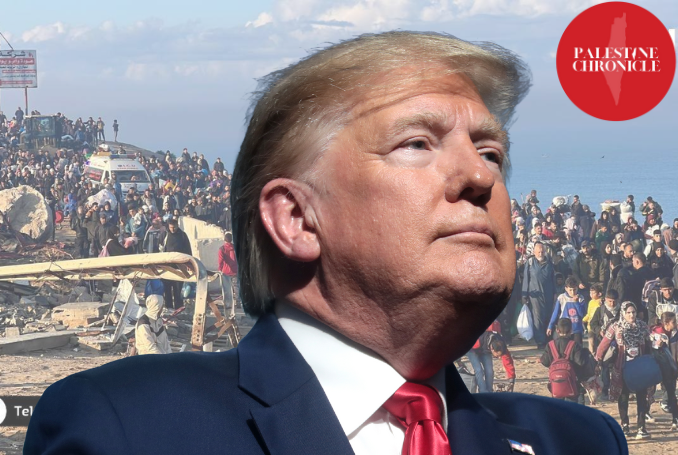
By Jamal Kanj
The Palestinian people, having endured decades of occupation and Jewish apartheid, would not be intimidated by Trump’s bluff.
I observed the King of Jordan nervously twitching his eyes as Trump unveiled his outrageous plan to take over Gaza. Yet, when asked to comment, the King remained conspicuously equivocal or evasive. His failure to speak out was emblematic of an Arab despot installed by colonial and post-colonial powers. He timidly shifted responsibility to the President of Egypt, as if deferring to another puppet would absolve him of accountability.
At times, it feels as though one would need to be a psychologist to fully dissect Donald Trump’s hyperbolic statements. His rhetoric is not just inflammatory when it comes to Palestine—it permeates nearly every topic he discusses.
Trump exemplifies the dangers of elevating a person of ignorance and limited intellect to a position of immense power. His remarks frequently diverge from reality, driven by self-interest and amplified by a circle of enablers who exploit his shallow understanding of governance and global affairs.
Trump relishes the sound of his own voice as much as he enjoys spewing nonsense. He operates within an insular bubble, meticulously constructed to exclude dissenting opinions. Only those who reinforce his skewed perceptions gain access, creating an echo chamber that amplifies his misinformation and emboldens his erratic behavior. His approach to leadership lacks depth, as he oversimplifies complex geopolitical matters into crude negotiations, where personal gain overshadows humanitarian concerns.
A clear example of Trump’s ignorance was manifested by his suggestion for the take ownership of Gaza, and more recently when he threatened to cancel the ceasefire if all Israeli captives were not released by noon on Saturday.
These pronouncements, characteristic of his impulsive and uninformed style, demonstrate his lack of understanding of the complexity of the Israeli occupation of Palestine. His statements were not rooted in strategic thinking but in a misguided belief that force and intimidation yield results.
Trump’s inner circle, predominantly Israel-first advocates, play a significant role in shaping his short-sighted declarations by feeding him biased and one-sided information. In such a case, his gullibility led him to believe that the Gaza ceasefire was a direct result of his threats to turn the strip into “hell.” When in fact, the cessation of Israeli aggression was achieved only after Israel agreed to a framework that Palestinians had accepted in May 2024.
The Palestinian resistance made the right decision this week by freezing the prisoner exchange after Israel effectively suspended the ceasefire agreement for failing, after more than a week, to show up for the second phase of negotiations.
This move underscored the lack of Israeli commitments and highlighted the need for international guarantees for any new agreements. By refusing to proceed under bad faith conditions, the Palestinian resistance demonstrated strategic patience and resilience, ensuring that Israeli bullying would not dictate new terms for the ceasefire roadmap.
Rather than threatening the victim, Trump should pressure Netanyahu to comply with the terms of the ceasefire agreement—including allowing the entry of heavy machinery to start clearing the destruction caused by the American-made bombs, opening the border for the delivery of tents and temporary shelters for those who lost their homes, and facilitating humanitarian aid—Trump has instead doubled down on his belligerent stance.
Trump’s ultimatum for the release of all Israeli captives, without any reference to Palestinian hostages held in Israeli jails, is a glaring example of how Israel-first agenda advocates exploit his lack of nuanced understanding of contemporary intricacies.
By presenting a complex geopolitical issue as a simple, time-bound demand, they capitalize on his tendency toward blunt rhetoric. This approach not only oversimplifies the issues at hand but also risks dragging the US as a party to the conflict with the broader consequences for regional stability.
Moreover, Trump should understand that after 15 months of genocide, Israel failed to secure the release of Israeli captives without agreeing first to end its onslaught on Gaza, and release of Palestinian hostages held in Israeli dungeons.
Israel realized, a little too late, that its continued aggression will only prolong the captivity and or cause more death to Israeli prisoners as a result of its indiscriminate bombing. In the end, Israel was forced to accept terms that it had previously rejected, demonstrating that brute force alone could not achieve its objectives.
Where Israel had failed after inflicting hell on the people of Gaza for over a year, Trump’s threats of “hell” would unlikely intimidate the Resistance. Just as Israel’s military machine was unable to break the will of a defiant people, Trump’s threats will fall on deaf ears.
The Palestinian people, having endured decades of occupation and Jewish apartheid, would not be intimidated by Trump’s bluff. Resistance in Palestine has survived against overwhelming odds, and Trump’s attempts to dictate new terms will meet the same fate as Israel’s 76 years old failed policies.
Donald Trump’s hyperbolic rhetoric, and the disconnect between his inflated self-perception and shallow understanding, underscores the dangers of his reliance on misinformation from Israeli firsters fostering his racist perspective against Palestinians.
Trump’s lopsided view, enables Israel-first donors and biased advisors, to shape the foreign policy of the world’s most powerful nation. These realities reveal a troubling mix of ignorance and arrogance to serve a foreign agenda above the strategic interests and priorities of the American people.
Ascribing grandiose names to his plans—whether it’s the so-called “Deal of the Century” or Trump’s latest proposal to build a beachside Riviera on the ruins of Palestinian homes—is neither visionary nor realistic. Rather than addressing the root causes, he reduces an unfolding humanitarian catastrophe in Gaza into an investment opportunity. Hence, Trump’s proposal for Gaza is not out of the box thinking, but rather out of touch with reality.

– Jamal Kanj is the author of “Children of Catastrophe,” Journey from a Palestinian Refugee Camp to America, and other books. He writes frequently on Arab world issues for various national and international commentaries. He contributed this article to The Palestine Chronicle